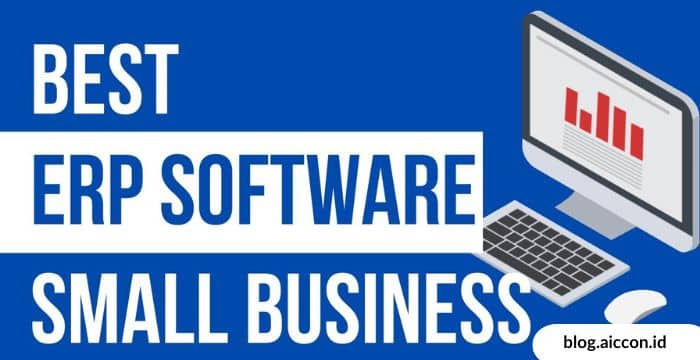I. Introduction
blog.aiccon.id | ERP for Small Business – In the ever-evolving landscape of modern business, the term “ERP” has become more than just an acronym; it’s a strategic imperative. ERP, or Enterprise Resource Planning, represents the backbone of efficient operations for companies of all sizes. This article embarks on a journey to demystify ERP’s significance and how it transforms small businesses. We’ll delve into the dynamic world of ERP, uncovering the value it brings, and exploring its implementation in the context of small businesses.
II. The Significance of ERP for Small Businesses
Small businesses are the lifeblood of our economies, but they face unique challenges. Limited resources, tight budgets, and the need to stay agile in a competitive market are just a few hurdles they navigate. This is where ERP shines as a game-changer. ERP offers small businesses the opportunity to level the playing field by optimizing processes, enhancing productivity, and providing real-time insights. It’s not just a tool; it’s a competitive edge.
III. Key Features and Functionalities of ERP for Small Businesses
ERP for small businesses is a tailored solution, and its features are designed to address specific needs. It’s the Swiss Army knife of business management:
- Accounting: Say goodbye to manual spreadsheets and hello to automated financial tracking and reporting.
- Inventory Management: Keep stock levels in check, reduce wastage, and ensure products are readily available.
- Customer Relationship Management (CRM): Build and nurture customer relationships with ease.
- Sales and Marketing: Optimize sales strategies and marketing campaigns based on real-time data.
- HR Management: Streamline hiring, onboarding, and employee management processes.
IV. Advantages of ERP for Small Businesses
- Improved Efficiency and Productivity: ERP automates time-consuming tasks, allowing employees to focus on strategic activities.
- Real-time Data Insights: Make data-driven decisions with up-to-the-minute information at your fingertips.
- Cost Savings: Reduce operational costs through streamlined processes and better resource allocation.
- Enhanced Customer Service: Deliver exceptional customer experiences with a 360-degree view of customer interactions.
- Scalability for Growth: As your small business expands, ERP grows with you, ensuring a seamless transition to the next level.
As we embark on this exploration of ERP for small businesses, the promise of efficiency, growth, and success becomes apparent. Stay with us as we delve deeper into the world of ERP, uncover real-world success stories, and chart the course for small businesses to thrive in an ever-competitive landscape.
V. Implementation of ERP for Small Businesses
Implementing ERP for a small business can be a transformative experience, but it’s not without its challenges. It’s essential to carefully consider factors such as the specific needs of your business, budget constraints, and the readiness of your team. The implementation process typically involves several key steps, from defining your objectives and selecting the right ERP solution to data migration and employee training. Best practices include involving key stakeholders, setting realistic timelines, and ensuring ongoing communication to address any roadblocks.
VI. Industry-Specific Applications
The beauty of ERP lies in its adaptability across industries. Whether you’re in retail, manufacturing, services, or any other sector, ERP can be tailored to suit your unique needs. Retailers use ERP to optimize supply chains and enhance customer experiences. Manufacturers rely on it for production planning and inventory management. In the services industry, ERP streamlines project management and client interactions. The versatility of ERP ensures that businesses in various sectors can benefit from its advantages.
VII. Real-World Success Stories
Real-world success stories are the heartbeat of ERP’s impact on small businesses. Consider Company A, a small manufacturing firm struggling to meet customer demands while controlling costs. With ERP, they gained real-time visibility into their supply chain, leading to a 15% reduction in production costs and a 20% increase in on-time deliveries.
Company B, a local retailer, faced stiff competition from e-commerce giants. ERP helped them optimize inventory, leading to a 25% reduction in excess stock. It also improved customer service with better order tracking and real-time inventory availability, resulting in a 15% increase in customer satisfaction.
VIII. Future Trends in ERP for Small Businesses
The future of ERP for small businesses is bright, with exciting trends on the horizon:
- Cloud-Based ERP: Cloud solutions offer scalability, flexibility, and cost-efficiency.
- AI and IoT Integration: AI-driven insights and IoT connectivity enhance decision-making.
- Data Security and Compliance: As data becomes increasingly valuable, robust security and compliance measures are crucial.
IX. Conclusion
In closing, ERP for small businesses isn’t a luxury; it’s a necessity for those seeking to thrive in the digital age. The advantages are clear—efficiency, cost savings, and scalability, among others. As we conclude this journey into the world of ERP, I encourage small business owners to take the leap. Explore the possibilities, leverage ERP’s potential, and propel your business towards a future where efficiency meets innovation. The road to success begins with ERP; are you ready to embark on it?
